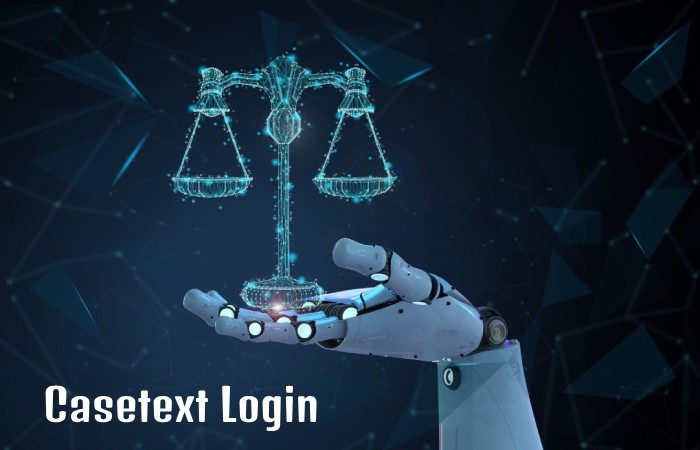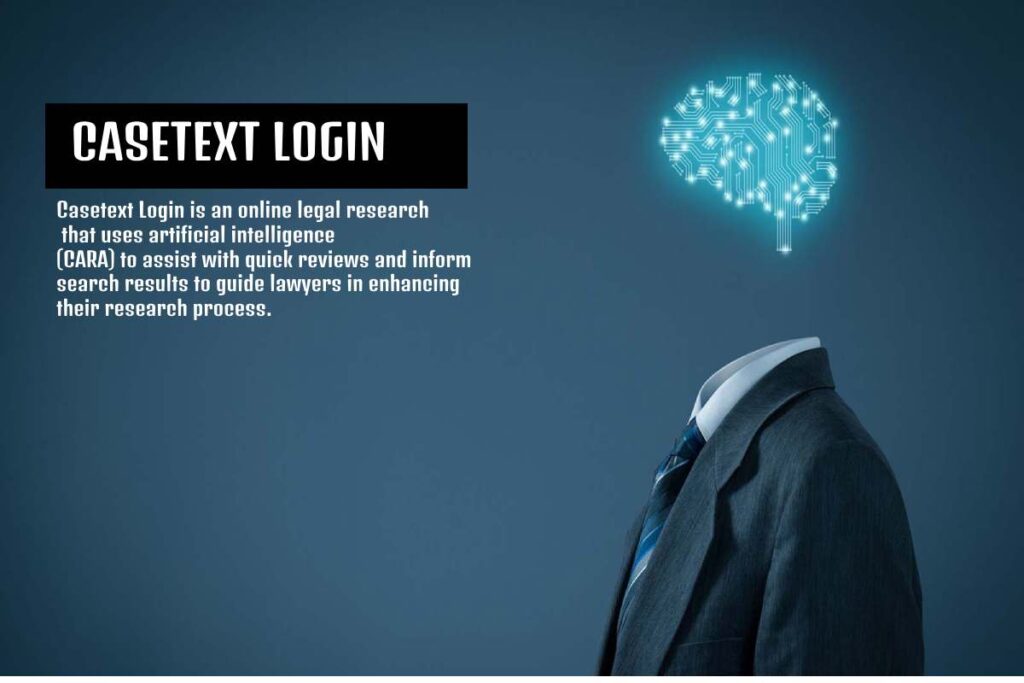Casetext Login is an online legal research that uses artificial intelligence (CARA) to assist with quick reviews and inform search results to guide lawyers in enhancing their research process. Our review of Casetext pricing finds a single tier for all its resources, including Statutes, Case Law, and Regulations in the Federal Courts and all 50 States. Its citator, SmartCite, leverages its CARA tool to guide to find the most relevant cases for your specific fact pattern. Moreover, it adds an extra orange “flag” to indicate when a case is still better law but relies on an overruled opinion.
Starting Cost: $65/user/month
How to Casetext Login
Are you stuck while trying to log in to Casetext? Follow these steps to log into your Casetext account.
- Navigate to https://casetext.com/login
- Click the email field.
- Type your email or username.
- Click the password field.
- Type your password.
- Click here to sign in.
Can I Create a Shortcut to Casetext Login Research on My Desktop?
You can create a shortcut to access Casetext Research from your computer’s desktop. These instructions and images are from a Chrome browser on a Mac, but the methods should apply to most browser situations.
- Visit the Casetext homepage (https://casetext.com).
- Chrome and Firefox: Put your cursor to the left of the URL, click on the lock icon, and hold.
- While stock the mouse button down, drag your bolt to the side of the screen, to the side of your browser window.
- Let go of your mouse button.
- It creates a shortcut on your desktop. When you double-click on it, you will be taken to Casetext.
- The default may include a longer title/site description, so If you want, you can rename it by clicking the text underneath the desktop icon and entering a new name:
Product Details Casetext Login

Apps
- Web
Software Integrations
- Clio
- FileVine
- Docketbird
- Hire an Esquire
Advantage
- Price
- Citation Check
- Integrations
Disadvantage
- Limited Secondary Sources
- No Open API
- No Public Records
Compare with Other Online Legal Research Websites. Download the Field Guide
Core Features
Online Legal Research has the following features; therefore, you should expect to see a check in every box in this section.
| Sno | Features | Yes | No |
| 1 | Free Trial | YES | |
| 2 | Artificial Intelligence (AI) | YES | |
| AI legal assistants can guide you identify relevant cases and may even help you draft your brief. | |||
| 3 | Natural Language Search | YES | |
| Can you search by entering a question in standard language rather than keywords, Boolean connectors, and phrases? | |||
| 4 | Boolean Search | YES | |
| You can precisely target your search query with Boolean operators like AND, OR, and more. | |||
| 5 | Case Summaries | YES | |
| 6 | Citation Checking | YES | |
| A citation checker leads you to identify whether a case or statute has been modified, overruled, reversed, or repealed. | |||
| 7 | Filter Search | YES | |
| Can you moderate your search to certain parts or reports of cases and statutes, like the date, judge, or jurisdiction? | |||
| 8 | Research History | YES | |
| It makes it easier to notice the results of previous searches or see if the law has convert with new results. | |||
| 9 | Research Folders | YES | |
| Organize your research history into folders. | |||
| 9 | PDF/Word Downloads | YES | |
| Download cases and statutes as a layout PDF or Word document. | |||
| 10 | Suggestions | YES | |
| When you run a search, get suggestions for some additional searches or material you should look at. | |||
| 11 | Alerts | YES | |
| Flag critical cases to get an email notification if it is cited in a new case or secondary source. | |||
| 12 | Open API | NO |
Who Is Casetext Login
Casetext is the best option for firms of all sizes that must perform online legal research using primary sources. Specifically, cost-conscious people who need more than Google Scholar will likely find the most benefit. It is because they use a single-tier, per-user pricing model that is easy to understand. Further, using CARA, solo and small firms may leverage limited resources to derive more benefits than the most prominent firms.
On the other hand, Lawyers who often rely on proprietary sources will likely want to supplement Casetext with another research tool.
Details about Casetext Login
Case Analysis
The case analysis research subordinate, or CARA, is Casetext’s AI-backed legal research method that guides the discovery of purpose cases and briefs based on legal agreement (complaints, briefs, and memos) connect to CARA. After uploading, CARA will analyze the brief and make all subsequent research more intelligent, instantly returning relevant cases on the same facts, legal issues, jurisdiction, and motion. It will also surface relevant articles, statutes, and briefs filed by another attorney on the same topic. It removes doubt about missing something after spending countless hours on research.
Citator Service
Casetext’s SmartCite, a citator service, is literate by its AI assistant, CARA. Most other citators, it will indicate bad, sound, and cases that may be problematic. However, SmartCite will also indicate when cases depend on subsequently overruled opinions.
Secondary Sources
Casetext does not have much in the methods of Secondary Sources. Unlike Westlaw or LexisNexis, it is mainly a resource for statutes, case law, and rules. Lawyers won’t find many proprietary resources, treatises, or journal articles. However, their website has excellent information on accessible and affordable secondary source tools.
Conclusion
Casetext is an online legal research that uses artificial intelligence (CARA) to assist with quick reviews and inform search results to guide lawyers in enhancing their research process. Our review of Casetext pricing finds a single tier for all its resources, including Statutes, Case Law, and Regulations in the Federal Courts and all fifty States. Its SmartCite citator also leverages its CARA method to help find the most relevant cases for your specific fact pattern. On the other hand, Lawyers who often rely on proprietary sources will likely want to supplement Casetext with another research tool.

